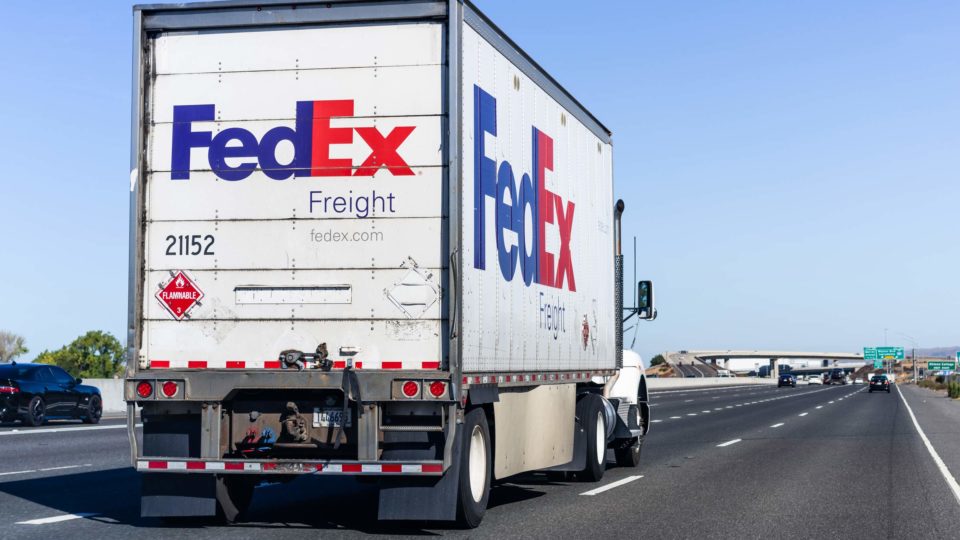Posted On June 17, 2021
The shipping and transportation industry has been dealing with one unexpected hurdle after another since the pandemic began—and last week, FedEx made a surprising announcement.
According to FreightWaves, FedEx Freight cancelled service to approximately 1,400 less-than-truckload customers to try to quell bottlenecks and shipping delays. The change was announced on Friday, June 11 with service ending by Monday, June 14, giving companies only one business day of notice to find alternatives.
Affected businesses were left scrambling. Due to current market conditions, many other less-than-truckload carriers are already operating at capacity—unable to take on bigger loads or new clients.
FedEx’s move is unprecedented in the industry. Companies relying on FedEx, North America’s largest LTL carrier by revenue, to transport hundreds of shipments a day are now facing major gaps in their supply chain. And it could get even worse.
What Happens Next for FedEx Customers, Other LTL Carriers and You
While FedEx’s announcement is a major blow to the businesses directly affected by it, FedEx does have its reasons. After all, the company is trying to maintain quality service for as many of its other customers as possible, and that has meant some tough choices.
Labor shortages caused by the pandemic have led the entire industry to be at or over capacity. Freight carriers have tried combating the shortage with recruitment and job fairs promoting $30/hour rates and $3,500 sign-up bonuses, to little avail. A peer in the industry told us that a recent job fair saw only two candidates show up—so don’t expect the shortages to end anytime soon.
Other market conditions have let to capacity issues in the past: bankruptcies, like
Consolidated Freightways’ bankruptcy in 2002, mergers like the one between Yellow and Roadway to become YRC Freight in 2003, and labor strikes, including one in California from earlier this year.
The effects aren’t pretty: cargo sits on docks or in stationary trailers for days or even weeks, piling up to create major backlogs. Products often getting lost in the shuffle.
It’s a logistical nightmare.
What will happen next isn’t yet known. FedEx may reverse its decision in a few days or weeks, after it gets a better grasp on capacity and demand. But by that point, some scorned customers might not want to return.
Additionally, the decision could create a ripple effect in the industry. As former FedEx freight customers flock to other LTL carriers, those carriers could shut down service as they struggle to keep up with the increased demand.
Fortunately, the cyclical nature of business means that things will eventually return to normal, but when and how are yet to be seen.
How to Ensure Your Company’s Supply Chain is Protected
Even after the situation improves (which could be in days, weeks or even months) there’s always the possibility of more disruptions from things like labor strikes, failed businesses and natural disasters. So even if your business isn’t a FedEx Freight customer, take this news as a reminder that anything can happen—and make sure your company is prepared.
Supply chain professionals should remember to not put all their eggs in one basket. Or in this case, all their shipments on one carrier.
Diversifying your supply chain to utilize different lanes and carriers can help provide a stopgap for unforeseen circumstances. We recommend maintaining ongoing relationships (and rate negotiations) with multiple carriers. In a pinch, trying to form a connection from scratch as a last-minute solution won’t be as easy as calling up a service rep or carrier you already know. And if carriers have to choose whom to serve, they will favor existing, long-term customers over taking on new ones.
Working with multiple carriers will also support costs in the event of a last-minute pivot. If a company that sends out several hundred shipments a day with Carrier A already has pricing negotiated with Carrier B, and Carrier A suddenly stops picking up shipments, the company will have a fighting chance of keeping costs low with Carrier B.
Your third-party logistics company should help you negotiate with multiple carriers and develop a contingency plan to lean on in emergencies.
If you have questions about diversifying your supply chain or need help finding alternative shipping options after FedEx’s announcement, let’s talk. Flat World can help connect you with other carriers and set you up with a transportation management system that allows you to easily shop multiple carriers and rates to find the best option for your company’s unique needs. Contact us to learn more.

